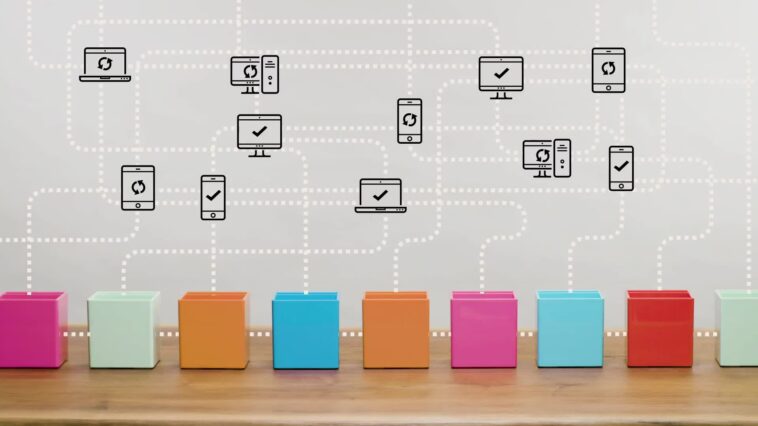Blockchain is a decentralized, peer-to-peer network that eliminates the middleman to ensure transactions are secure, fast and cost effective. Unlike financial institutions, it doesn’t need verification by third parties for approval.
Blockchain technology makes financial transactions irreversible, eliminating the need for centralized authority to alter records.
It’s a digital ledger
Blockchain is a digital ledger that stores data in “blocks,” linked together on a chain using shared mathematical algorithms. These blocks are immutable and resistant to manipulation, allowing users to monitor transactions along the chain.
This technology is used for a range of tasks, from transferring currency to monitoring goods and services. It may even be employed to verify the legitimacy of transactions or other data.
For instance, the food industry utilizes blockchain to track foods from their origins through multiple stops in supply chains. This helps brands guarantee their products are safe to consume.
In the past, brands could take weeks to discover if their foods were contaminated with harmful substances like E. coli, salmonella or listeria. But now thanks to blockchain technology that stores product journeys on a blockchain platform, brands can quickly identify any contamination and take necessary action for remediation.
Blockchain can also be utilized to register the ownership of property. In places without government or financial infrastructure, it may be difficult to determine who owns a piece of land. By recording deeds on a blockchain, property owners can ensure their records remain accurate and won’t get lost in the shuffle.
Furthermore, it can help eliminate the need for a local recording office, thus cutting back on property registration expenses.
Decentralized networks of computers that share information and collaborate to solve problems have been formed through advances in computing power, cryptography advances and new algorithms.
Databases like this one can store any kind of information, such as financial transactions, medical records, property titles and more. Furthermore, it’s capable of creating and executing smart contracts – computer code that automatically executes certain tasks based on certain conditions.
Due to its high level of transparency, it has become a go-to option for companies seeking to enhance the flow of data across their networks. Auditing transactions recorded on it becomes simpler due to its inflexible nature; additionally, companies looking to strengthen security and privacy can find this platform beneficial.
It’s a decentralized network
Blockchain is a network of computers that use cryptography to keep a digital ledger that cannot be altered. This provides users with security when conducting transactions without the need for intermediaries like banks or other third parties.
Decentralized networks, like blockchains, operate without reliance on one central authority to maintain stability. Instead, they are controlled by their community or individual participants for greater transparency and freedom of action.
This technology has numerous applications and is utilized across numerous industries. Hospitals use it for patient records tracking, while agricultural firms utilize it to keep tabs on product supply chains.
Additionally, blockchain has the potential to eliminate fraud from elections by making it harder for people to vote illegitimately. This could be especially helpful in war-torn countries or regions with little government or financial infrastructure, as well as those without a Recorder’s Office.
Blockchain’s integrity is safeguarded by a mathematical combination called the hash that appears on each block of data and other network protocols. If a block is modified or deleted, its hash changes, alerting others in the network that something has been changed.
Verifying a new entry or record into a block requires consensus among most of the network’s computing power. Usually this is accomplished using techniques such as proof of work (PoW) or proof of stake (PoS).
Blockchain data is encrypted, making it immutable. Therefore, blockchains can be used to store irreversible information such as lists of transactions or legal contracts.
Blockchains can also be utilized for other records, such as product inventories, state identifications or deeds of property. These data is stored in blocks that have a limited capacity – only holding so much information before becoming full.
Blockchains enable decentralized systems to store a vast amount of information, which is necessary for them to function optimally and remain secure. As such, blockchain technology is being adopted across numerous sectors and industries.
It’s secure
Blockchains are decentralized networks composed of computers, making them highly resistant to hacks or changes. To alter a chain in this decentralized environment, hackers would need control of more than half the computers on the network – an unlikely scenario.
Blockchains also utilize consensus algorithms, which guarantee that all nodes on the network agree on the validity of new blocks of data. These measures prevent bad actors from validating invalid transactions or enabling users to double spend their coins (a common security concern with cryptocurrencies).
Blockchain offers one major advantage, eliminating the need for a third party like a government or bank. This reduces transaction costs and speeds up settlement times – saving both businesses and consumers money in the process!
Blockchain technology is best known for its application with cryptocurrencies, such as Bitcoin. But it can also store and immutably record other types of digital information and records. Examples include legal contracts, state identifications, product inventories and deeds to homes – just to name a few.
Another advantage of blockchain technology is that it’s encrypted, making it virtually impossible for anyone to alter the data once added to the network. This helps protect against identity theft as well as maintaining the accuracy of a person’s medical records.
A secure network is composed of devices connected to the internet that have taken steps to protect themselves from hackers. This could include installing routers, antivirus software and anti-malware protection.
By taking these precautions, you can keep your home, office or school secure from cyber attacks that could cause harm to your computer or business. Additionally, it can prevent slow connection speeds and unexplained losses in Internet access.
A secure network can also keep data interception, adware, spam and spyware at bay – which can be irritating and disruptive in your daily life. Furthermore, it helps protect your privacy by blocking unauthorized access to your computer or phone.
It’s fast
Blockchains are digital ledgers that record transactions and data chronologically. This ensures the information recorded is accurate, unalterable, and ideal for storing sensitive information that would otherwise be at risk of mishandling.
Blockchain technology enables the storage and recording of a variety of data points, such as payments, inventory, product identifications, voting in elections and deeds to homes or other property. Furthermore, it eliminates the need for intermediaries like banks and brokers, saving time and money through reduced time-consuming processes.
For instance, many hospitals utilize blockchain to track medical records and ensure accuracy. Agricultural firms utilize it for tracking supply chains and product safety. Smart contracts, which automate payments and other transactions when certain conditions are met, are another key application of this technology.
Scalability is one of the key characteristics that any blockchain network must have. This refers to its capacity for handling an increasing number of transactions without slowing down. Unfortunately, scalability cannot be achieved overnight.
Even the most scalable blockchain networks, like Bitcoin, may not always be fast enough to process all transactions quickly and efficiently. That’s because the blockchain requires a large number of computers to verify transactions – an energy-intensive requirement that contributes to environmental degradation.
Blockchain is still relatively untapped technology, yet it’s already being applied to tackle some major economic problems that have been plaguing the global economy for years. And its potential impact could be monumental on how businesses operate.
Blockchain works by connecting together “blocks” of data in a chain that is continually being updated with new blocks. Each block contains specific amounts of data and its timestamp which tells when it was created – this feature gives blockchain its uniqueness and makes it ideal as a secure system for storing and tracking sensitive information.
The block structure also helps ensure there is no single point of failure in the system. Each computer contributing to the blockchain stores a copy of information and checks with others regularly to confirm they have the same record. This security measure prevents malicious agents from altering data on a blockchain.



